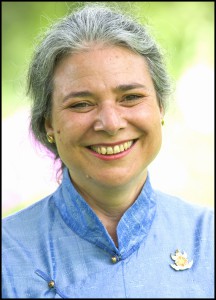Thursday
Dharma TeachingsQueer Dharma: The Truth of Being Queer
COLUMN: Dharma Teachings
by Acharya Eve Rosenthal
article courtesy of Shambhala Mountain Center
What is queer dharma? There are people who are queer and there is dharma, but what is queer dharma? First of all, a person who is queer identifies as someone with a sexual orientation outside culturally established norms. In our culture, it is someone who is not heterosexual — a person who identifies as lesbian, gay, bisexual, or transgender. It is someone who does not want to put a label to their sexuality, or someone who is questioning their sexual identity. Dharma in its broadest context means truth or what is, and can also mean the Buddhist teachings — which is saying the same thing. The Buddha experienced the truth of reality and then talked about it. These are the Buddhist teachings that have been written and passed down orally. The path of meditation is the way to gently make the journey from self-deception to truth.
Editor’s Note: We are currently on hiatus from publishing new articles; in the meantime, please enjoy this classic item reprinted from our back issues.
So, queer dharma is the truth of being queer. Everyone who is queer realizes at some point in their life’s journey that they have feelings for others, or about themselves, that are outside what is easily accepted in our society. At best, it results in some serious soul searching to come to terms with who one really is, and at worst, imprisonment or death. There are probably not many queer folk planning to vacation in Uganda, Nigeria, or Russia any time soon. Even in relatively tame countries like Canada that have accepted same-sex marriage, there are still unthinkable hate crimes against sexual minorities. Even if we live in a relatively accepting world, there are privileges of heterosexuality that are taken for granted and not available to all. Here is a great web page about heterosexual privilege, homophobia and its impact, and things non-transgender people take for granted: www.csulb.edu/colleges/chhs/safe-zone/privilege.
There are two key themes that define Shambhala — that the nature of all humans is basically good, and when people relate to others and the environment from their inherent goodness, a good human society manifests. There are countless examples of good human relationships between people and communities that value kindness above individual self-interest. Sadly, we often doubt our basic goodness and self-worth. This results in a constant attempt to find happiness outside of ourselves as demonstrated by the tyranny of materialism ruling our lives.
Community
Queer people have to come to grips with who they are because of the obstacles they face in society. Whether one has achieved peace with that or not, it is good to be with others who respect and recognize your journey. There is comfort and deep relaxation in just knowing that. However, there is something more to these retreats than just the comfort of being with sympathetic people.
Meditation
By virtue of being queer and outside the societal norm with regard to sexuality, we are required to explore the dharma of ourselves to cut through confusion about who we are and not be afraid of that — probably more than those who have heterosexual privilege. The path of meditation is a natural way to accomplish this exploration of “who we really are” and come to certainty regarding our self-worth.
Social Innovation
My experience of doing queer dharma retreats is that people are generally well along the journey of this exploration, whether they are experienced with or new to official “dharma” and meditation. That affords the Shambhala queer dharma community a unique opportunity — to go the next step beyond the individual journey and explore what it means to be a good human community based on kindness. The courage that inspired our non-negotiable self-reflection can extend into reflecting on our relationships with others, and to be genuine about what prejudices and habitual patterns are barriers to kindness.
The aspiration is that the queer community can be an example to the greater society as humans who treat other humans well. Chogyam Trungpa said, “you bring your whole self to meditation” and that in Shambhala, your whole queer self is welcome and celebrated. In fact, this retreat is an opportunity to explore how we might share the gift of our queerness with others. The gift being that we can come to know, through meditative reflection, that we are basically good and have much to contribute to the creation of an enlightened society.






Nov 16, 2018
Reply
Thank you so much for this, Acharya Rosenthal. This is such a ripe time to recognize this segment of our Sangha as we work toward more inclusion.
Mar 13, 2014
Reply
I appreciate this article! Perhaps Shambhala, as an organization, would considering being more active and publicly vocal in the marriage equality movement.